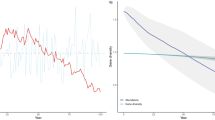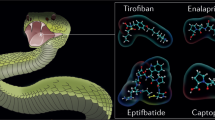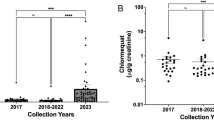Abstract
THE tropical fish poisoning known as ‘ciguatera’, which is clearly different from the well-documented tetraodon poisoning, has long been known in the Pacific. Its narrow regional appearance and its variability within a given species of marine fish have been puzzling phenomena. The symptoms associated with ciguatera have been well described, but fundamental knowledge of the toxin is virtually non-existent. The present state of this problem has recently been reviewed by Randall1.
This is a preview of subscription content, access via your institution
Access options
Subscribe to this journal
Receive 51 print issues and online access
$199.00 per year
only $3.90 per issue
Buy this article
- Purchase on Springer Link
- Instant access to full article PDF
Prices may be subject to local taxes which are calculated during checkout
Similar content being viewed by others
References
Randall, J. E., Bull. Marine Sci. Gulf and Caribbean, 8, 236 (1958).
Macht, D. I., and Spencer, E. C., Proc. Soc. Exp. Biol. Med., 46, 228 (1941).
Halstead, B. W., and Bunker, N. C., Zoologica, 39, 61 (1954).
Author information
Authors and Affiliations
Rights and permissions
About this article
Cite this article
BANNER, A., SASAKI, S., HELFRICH, P. et al. Bioassay of Ciguatera Toxin. Nature 189, 229–230 (1961). https://doi.org/10.1038/189229a0
Issue Date:
DOI: https://doi.org/10.1038/189229a0
This article is cited by
Comments
By submitting a comment you agree to abide by our Terms and Community Guidelines. If you find something abusive or that does not comply with our terms or guidelines please flag it as inappropriate.



